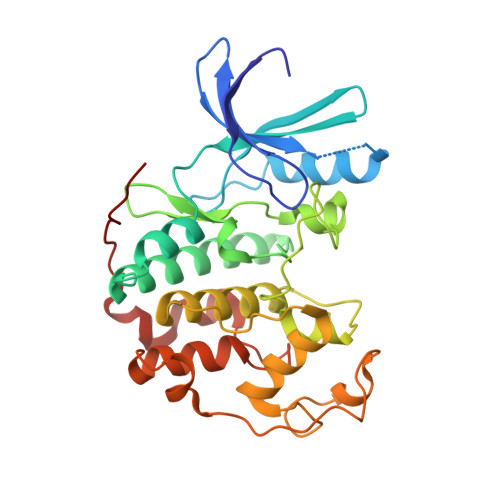Identification of Novel Purine and Pyrimidine Cyclin-Dependent Kinase Inhibitors with Distinct Molecular Interactions and Tumor Cell Growth Inhibition Profiles.
Arris, C.E., Boyle, F.T., Calvert, A.H., Curtin, N.J., Endicott, J.A., Garman, E.F., Gibson, A.E., Golding, B.T., Grant, S., Griffin, R.J., Jewsbury, P., Johnson, L.N., Lawrie, A.M., Newell, D.R., Noble, M.E.M., Sausville, E.A., Schultz, R., Yu, W.(2000) J Med Chem 43: 2797
- PubMed: 10956187
- DOI: https://doi.org/10.1021/jm990628o
- Primary Citation of Related Structures:
1E1V, 1E1X - PubMed Abstract:
Substituted guanines and pyrimidines were tested as inhibitors of cyclin B1/CDK1 and cyclin A3/CDK2 and soaked into crystals of monomeric CDK2. O6-Cyclohexylmethylguanine (NU2058) was a competitive inhibitor of CDK1 and CDK2 with respect to ATP (Ki values: CDK1, 5 +/- 1 microM; CDK2, 12 +/- 3 microM) and formed a triplet of hydrogen bonds (i.e., NH-9 to Glu 81, N-3 to Leu 83, and 2-NH2 to Leu 83). The triplet of hydrogen bonding and CDK inhibition was reproduced by 2,6-diamino-4-cyclohexylmethyloxy-5-nitrosopyrimidine (NU6027, Ki values: CDK1, 2.5 +/- 0.4 microM; CDK2, 1.3 +/- 0.2 microM). Against human tumor cells, NU2058 and NU6027 were growth inhibitory in vitro (mean GI50 values of 13 +/- 7 microM and 10 +/- 6 microM, respectively), with a pattern of sensitivity distinct from flavopiridol and olomoucine. These CDK inhibition and chemosensitivity data indicate that the distinct mode of binding of NU2058 and NU6027 has direct consequences for enzyme and cell growth inhibition.
- Department of Chemistry, University of Newcastle, Newcastle upon Tyne, UK.
Organizational Affiliation:

















